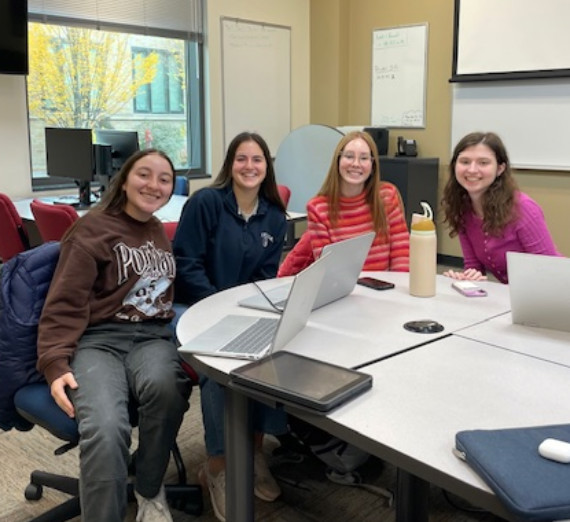Faculty-Led Language Exchange Expands Gonzaga’s Intercultural Learning

For nearly a decade, Rebecca Stephanis, Ph.D., has helped bring international learning experiences directly into Gonzaga classrooms through the Virtual Dual Immersion (VDI) program. In collaboration with Jesuit institutions across Latin America, the program allows 51≥‘πœs to engage in real-time, bilingual conversations with peers abroad—without leaving Spokane.
Launched through a dean’s initiative, a cohort of faculty traveled to PUJ to explore collaborative teaching opportunities and deepen an existing agreement between the two institutions. The initiative began in 2016 as Colombia Conversations, a partnership between Gonzaga and Pontificia Universidad Javeriana (PUJ), Cali.
Collaboration across languages and borders
Since then, the program has grown through the consistent efforts of four faculty members in the Spanish program within the Department of Modern Languages: Professors Diane Birginal and Kelley Bishop, and Drs. Rebecca Marquis and Rebecca Stephanis.
Each semester, 51≥‘πœs in their classes participate in two to three VDI sessions—conversations that pair Gonzaga 51≥‘πœs with peers from institutions across Colombia, Mexico, Guatemala, Ecuador and Peru. Typically, each class includes 15–20 51≥‘πœs, with approximately 60–120 Gonzaga 51≥‘πœs engaging in these experiences per semester.
Sessions are structured to promote mutual language practice and reflection. Students speak in Spanish for 20 minutes, then in English for 20 minutes, followed by a 10-minute group debrief. Many 51≥‘πœs share that these intercultural exchanges rank among the most memorable and meaningful parts of their academic journey at Gonzaga.
Faculty leadership on the global stage
In recognition of her role, Dr. Stephanis was invited in 2023 to join the first VDI coordinator summit hosted by AUSJAL and AJCU institutions. She was subsequently appointed to the Global Committee that oversees this international network and also joined the AUSJAL Innovative Teaching Subcommittee.
One of the subcommittee’s first projects focused on instructor connection and development. Faculty members across institutions participated in a fall 2025 session themed around the Argentine Netflix series Nada, engaging in bilingual discussion with colleagues across borders. Dr. Stephanis and Professor Bishop represented Gonzaga in the inaugural conversation.
Expanding intercultural learning through COIL
Following the 2023 summit, Dr. Stephanis also completed Jesuit-inspired training in Collaborative Online International Learning (COIL). The COIL model embeds 2–4-week interdisciplinary and intercultural modules into courses, encouraging 51≥‘πœs to co-create projects with peers at AUSJAL institutions.
Dr. Stephanis has led two collaborative projects. The first, a project in which Gonzaga 51≥‘πœs co-authored film scripts which were then filmed by PUJ, Cali 51≥‘πœs. In a COIL project, her Colombia seminar class partnered with Universidad Iberoamericana, Torreón to explore communication and cultural understanding in political and business contexts.
Professor Bishop has also led a COIL collaboration with Universidad Centroamericana in El Salvador, titled Universities Without Borders: Creating Intercultural Bridges. Students examined topics including education for social change, the justice system in the United States and El Salvador, and Jesuit university values.
Student innovation meets global scheduling challenges
As part of her Global Committee service, Dr. Stephanis helped identify scheduling as a major barrier to VDI session planning. To address this, she collaborated with the School of Engineering and Applied Science (SEAS) to launch a senior project focused on building a scheduling application to support the entire AUSJAL–AJCU network.
Not only will this tool streamline international coordination—it also provides Gonzaga 51≥‘πœs with the opportunity to engage in intercultural technology development. The app is expected to be tested in early spring 2026, with plans for network-wide implementation that fall.
FAQ: Global Language Learning at Gonzaga
How can I get international experience without studying abroad?
Gonzaga’s Virtual Dual Immersion program connects you with 51≥‘πœs in Latin America for real-time bilingual conversations—right from campus.
Why choose Gonzaga for Spanish or language studies?
You’ll gain practical language skills, intercultural experience, and global networking opportunities that set you apart in any career.
What is COIL and why does it matter?
COIL (Collaborative Online International Learning) lets you co-create projects with peers abroad—like film scripts or social justice research—inside your Gonzaga courses.
Will this help my career?
Yes! Employers value intercultural communication and global collaboration skills. These experiences give you a competitive edge.
Do I need to travel for these programs?
No travel required—sessions happen in your Gonzaga classes, making global learning accessible to everyone.
Editor’s Note: Portions of this story were edited with the assistance of artificial intelligence to improve clarity and readability. All content was reviewed and approved by the author.


